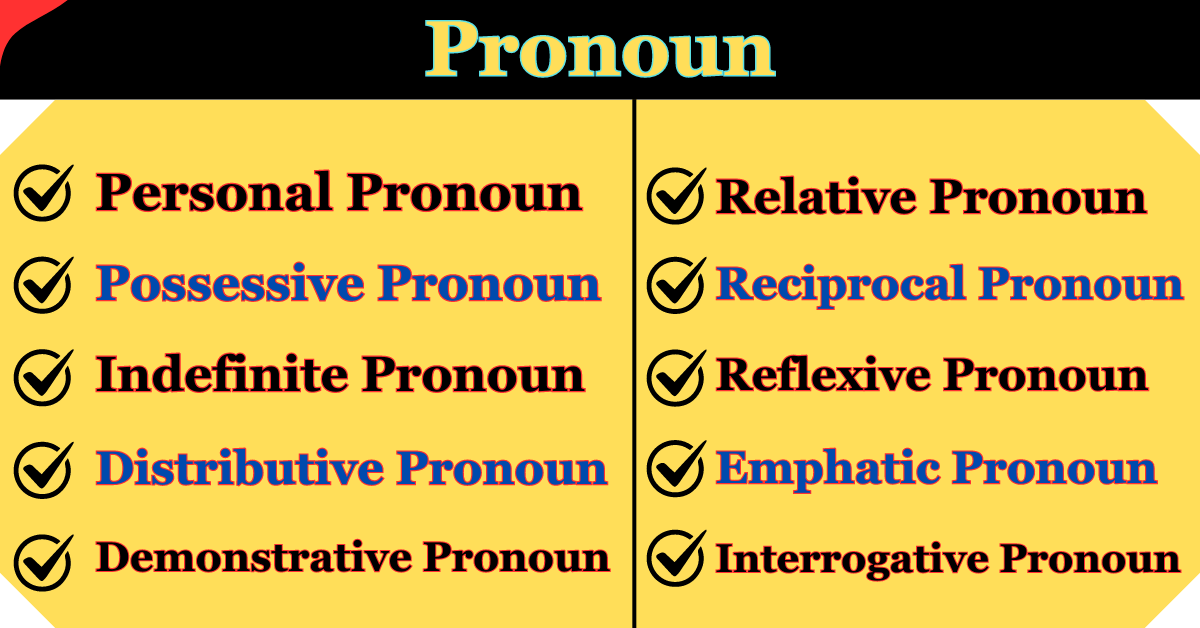Parts of Speech can be classified into 8 types. Pronoun is one of them. We can avoid repetition of a noun by using a pronoun.
What is Pronoun? Example
A Pronoun is a word that is used instead of a Noun.
Some Definitions of “Pronoun” are as follows :
- “A word used instead of a noun is called a Pronoun.” – J. C. Nesfield
- “A Pronoun is a word used instead of a noun.” -Wren & Martin
- A Pronoun is a word that is used in place of Noun in order to avoid repetition of a noun.
For example,
I, You, He, She, We, They, His, Her, etc.
- I am playing football.
In this sentence, “I” is a pronoun. - We are going to school.
In this sentence, “We” is a pronoun.
In the following examples, pronouns are used instead of nouns :
- Puja is a student. She reads in Class IX.
- I know the boy. He lives in Mumbai.
In the first example, the Pronoun “she” is used instead of repeating the noun “Puja“.
In the second example, the Pronoun “he” is used instead of repeating the noun “boy“.
Pronoun : Classification
Pronouns can be classified into Ten kinds.
These are as follows :
- Personal Pronoun
- Possessive Pronoun
- Reflexive Pronoun
- Emphatic Pronoun
- Demonstrative Pronoun
- Indefinite Pronoun
- Distributive Pronoun
- Reciprocal Pronoun
- Relative Pronoun
- Interrogative Pronoun
What is Personal pronoun? Example
Personal pronouns are used for three persons (First person, Second person, Third person). Personal pronouns refer to a specific person or thing.
For example,
I, we, he, she, you, they, it, etc.
- He is poor.
In this sentence, “He” is a Personal pronoun. - I am a student.
In this sentence, “I” is a Personal pronoun. - You are an intelligent girl.
In this sentence, “You” is a Personal pronoun. - They are playing football.
In this sentence, “They” is a Personal pronoun.
What is Possessive pronoun? Example
Possesive Pronouns are used to indicate possession. The forms of Personal pronouns which indicate possession are called Possessive forms of Personal pronouns.
For example,
Mine, ours, his, hers, yours, theirs, its, etc.
- This book is mine.
In this sentence, “mine” is a Possessive pronoun. - That garden is yours.
In this sentence, “yours” is a Possessive pronoun.
What is Reflexive pronoun? Example
Reflexive pronouns are formed by joining suffix “-self” to the Singular number of Personal pronouns and “-selves” to the plural number of Personal pronouns. These pronouns are used when the subject and object refer to the same person or thing.
A Reflexive Pronoun is used as the Object of a verb or of a preposition. So, it comes after a verb or a preposition.
For example,
Myself, yourself, himself, herself, itself, ourselves, yourselves, themselves, etc.
- You can do it yourself.
In this sentence, “yourself” is a Reflexive pronoun. - He blamed himself
In this sentence, “himself” is a Reflexive pronoun. - I hurt myself.
In this sentence, “myself” is a Reflexive pronoun.
What is Emphatic pronoun? Example
Emphatic pronoun is used to emphasize a noun or pronoun. These pronouns are used to lay stress on the subject. These are used just after the subject or the object. Emphatic pronouns are used to emphasize that the action is done by no one else. Emphatic pronouns are used with nouns or pronouns for the sake of emphasis.
For example,
Myself, yourself, himself, herself, itself, oneself, ourselves, yourselves, themselves, etc.
- She herself solved the problem.
In this sentence, “herself” is an Emphatic Pronoun. - I myself wrote this letter.
In this sentence, “myself” is an Emphatic Pronoun.
What is Demonstrative pronoun? Example
Demonstrative pronouns are used to point out any specific thing in a sentence. These are used to denote specific persons or things.
For example,
This, that, these, those, etc.
- This is my book.
In this sentence, “this” is a Demonstrative pronoun. - Those are my friends.
In this sentence, “those” is a Demonstrative pronoun.
What is Indefinite pronoun? Example
Those pronouns which do not refer to any specific person, thing are called Indefinite pronouns. Indefinite Pronouns are used to refer to persons or things in a general way, not to refer to any particular person or thing.
For example,
Everyone, anyone, someone, everybody, anybody, somebody, nobody, everything, something, nothing, anything, any, one, no one, all, none, many, etc.
- Everybody should learn English.
In this sentence, “everybody” is an Indefinite pronoun. - Nobody will go there.
In this sentence, “nobody” is an Indefinite pronoun.
What is Distributive pronoun? Example
Distributive pronouns are used to consider members of a group separately rather than collectively. These pronouns separate one person or thing from a group.
For example,
Each, either, neither, etc.
- Each of them got a prize.
In this sentence, “each” is a Distributive pronoun. - Neither of them was present there.
In this sentence, “neither” is a Distributive pronoun. - Either of the two boys will win the race.
In this sentence, “either” is a Distributive pronoun.
What is Reciprocal pronoun? Example
Pronouns that indicate a mutual relationship are called Reciprocal Pronouns. These pronouns indicate that two or more people are performing an action reciprocally or mutually.
For example,
Each other, one another, etc.
- “Each other” is used to denote a relationship between two persons.
- “One another” is used to denote a relationship among more than two persons.
- The two boys hate each other.
In this sentence, “each other” is a Reciprocal pronoun. - We should love one another.
In this sentence, “one another” is a Reciprocal pronoun.
What is Relative prononun? Example
Relative pronouns are used to connect a clause or a phrase to a noun or pronoun. These pronouns are used to tell us more about a person or thing.
For example,
Who, which, whose, whom, that, etc.
- I know the boy who came yesterday.
In this sentence, “who” is a Relative pronoun. - This is the book which belongs to my grandfather.
In this sentence, “which” is a Relative pronoun.
What is Interrogative pronoun? Example
Interrogative pronouns are used to ask questions.
For example,
Who, what, which, whose, whom, etc.
For example,
- Who are you ?
In this sentence, “who” is an Interrogative pronoun. - What is your name ?
In this sentence, “what” is an Interrogative pronoun. - Whom do you want?
In this sentence, “whom” is an Interrogative sentence.
FAQs
What kind of pronoun is “I”?
“I” is an example of Personal pronoun. Some examples of Personal pronouns are : I, we, he, she, they, etc.
What kind of pronoun is “myself” ?
“Myself” is an example of Reflexive pronoun. It is also used as an Emphatic pronoun. Some examples of Reflexive & Emphatic pronouns are : Myself, yourself, himself, herself, itself, ourselves, yourselves, themselves, etc.
I hurt myself.
In this sentence, “myself” is a Reflexive pronoun.
I myself wrote this letter.
In this sentence, “myself” is an Emphatic Pronoun.
Which type of pronoun is “mine”?
“Mine” is an example of Possessive pronoun. Some examples of Possessive pronouns are : Mine, ours, his, hers, yours, theirs, its, etc.
This book is mine.
In this sentence, “mine” is a Possessive pronoun.
What type of pronoun is “someone” ?
“Someone” is an example of Indefinite pronoun. Some examples of Indefinite pronouns are : Everyone, anyone, someone, everybody, anybody, somebody, nobody, everything, something, nothing, anything, any, one, no one, all, none, many, etc.

